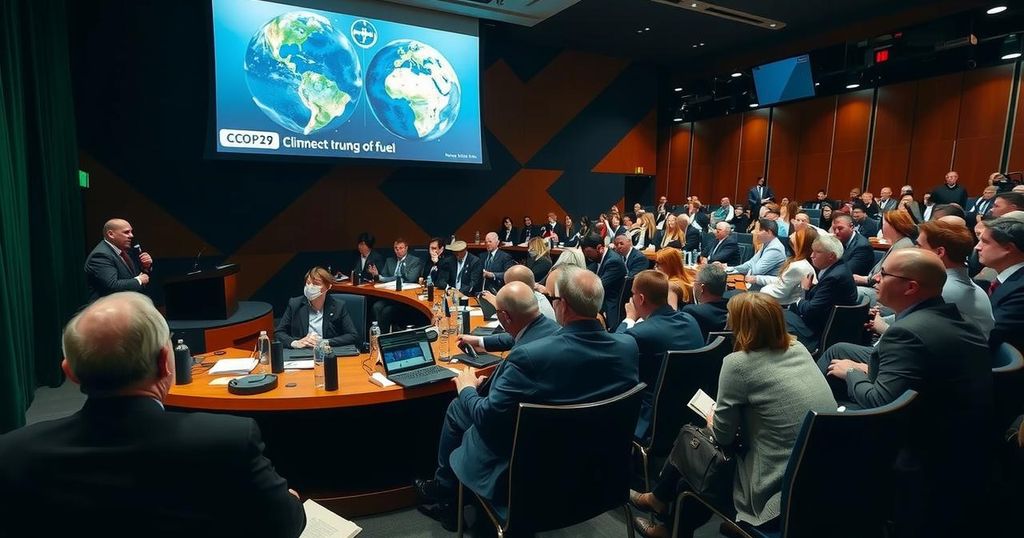Climate change
ANTONIO GUTERRES, ASIA, AZERBAIJAN, BAKU, CEDRIC SCHUSTER, CLIMATE ACTION, CLIMATE CHANGE, CLIMATE JUSTICE, EA, EAMON RYAN, ED MILBAND, ENVIRONMENTAL POLICY, EU, EUROPE, EUROPEAN UNION, GREENHOUSE GAS EMISSIONS, GROUP, IRELAND, JOHN PODESTA, NEW ZEALAND, OCEANIA, PARIS AGREEMENT, RYAN, SAMOA, UN, WO, WOPKE HOEKSTRA
Isaac Bennett
0 Comments
Tensions Rise at COP29 Over Fossil Fuel Commitments and Financial Support
At COP29 climate talks in Azerbaijan, a dispute erupted over a draft deal perceived as a setback on fossil fuel commitments. Key nations expressed displeasure, emphasizing the need for financial support for developing countries to combat climate change, amidst fears of backsliding on previous agreements. The discussions reflect broader tensions regarding climate action and economic interests among nations globally.
At COP29 climate talks in Baku, Azerbaijan, tensions arose as leading nations expressed concern that a draft agreement could reverse commitments made to decrease fossil fuel usage, essential for mitigating global warming. UK Energy Minister Ed Milband remarked, “Standing still is retreat and the world will rightly judge us very harshly if this is the outcome,” highlighting the urgency of maintaining momentum in climate action. The proposed deal has been declared “unacceptable” by representatives from the UK, European Union, New Zealand, and Ireland.
Developing nations voiced dissatisfaction over the absence of financial provisions to assist them in combating climate change. With nearly 200 nations engaged in negotiations, UN Secretary General Antonio Guterres emphasized that “failure is not an option.” The negotiations focus on balancing commitments from developed nations to provide financial support with the necessity to reduce fossil fuel consumption. Some developing and oil-exporting countries have hesitated to endorse aggressive cuts to fossil fuel use, fearing adverse impacts on their economies.
During discussions, EU Commissioner for Climate Action Wopke Hoekstra criticized the draft as “unbalanced, unworkable and unsubtle.” US Climate Envoy John Podesta noted surprise at the lack of continuity from commitments made in previous talks. Cedric Schuster, a representative of vulnerable small island nations, asserted that they cannot afford to risk the advances achieved at COP28 last year, where nations agreed to transition away from fossil fuels.
Diplomatic frustration emerged regarding the Azeri hosts of COP29, whose draft appears to favor the perspectives of the Arab nations, particularly Saudi Arabia, which has suggested that commitments remain negotiable rather than obligatory. Minister Ryan of Ireland articulated concerns about potential backsliding on agreed commitments, calling for a firm rejection of interpretations that undermine previously established agreements.
Developing nations have also pointed to inaction from wealthier nations to fulfill financial pledges made in the Paris Agreement of 2015. A recent proposal lacking specific financing figures sparked outrage, with Bolivia’s lead negotiator, Diego Pacheco, denouncing it as “an offense to the demands of the global south.” The G77+China group is advocating for $1.3 trillion by 2030 to support climate resilience, expressing frustration over the lack of clarity concerning the source of these funds.
In summary, COP29 has witnessed significant contention over the proposed draft deal, crucially implicating global efforts to address climate change and highlighting the ongoing struggle between developed and developing nations over financial commitments and fossil fuel reduction.
The COP29 climate talks are a continuation of the global dialogue aimed at addressing climate change, building upon previous agreements such as the landmark Paris Agreement of 2015. These negotiations involve nearly 200 nations, focusing particularly on mitigating the use of fossil fuels while ensuring developing nations receive adequate financial support to transition to sustainable practices. The underlying challenge lies in reconciling the economic concerns of oil-rich nations with the urgent necessity of environmental responsibility inherent to global climate efforts.
The discussions at COP29 underscore the critical and contentious nature of international climate negotiations, particularly concerning fossil fuel reduction and financial support for developing countries. With criticism directed at the draft agreement’s potential rollback of previous commitments, the outcome of these talks will be pivotal in shaping future actions against climate change. Continued pressure from both developed and developing countries will be essential in achieving a balanced and effective resolution that upholds the promises made in earlier climate summits.
Original Source: www.bbc.com




Post Comment